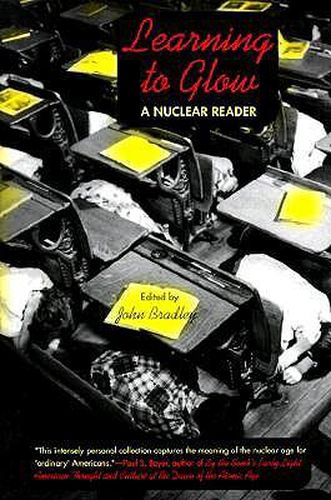Readings Newsletter
Become a Readings Member to make your shopping experience even easier.
Sign in or sign up for free!
You’re not far away from qualifying for FREE standard shipping within Australia
You’ve qualified for FREE standard shipping within Australia
The cart is loading…






Atomic energy is not only invisible, it has been cloaked in secrecy by government, industry, and the military. Yet for many Americans the effects of radiation have been less than secret. Just ask the radium workers in Ottawa, Illinois, the downwinders of Utah, or unsuspecting veterans of the Gulf War. When told from the perspective of ordinary people, nuclear history takes on a much different tone from that of the tranquil voices of authority who always told us we had nothing to fear. In Learning to Glow, twenty-four essays testify to many of the unsuspected human and environmental costs of atomic science. They show that Americans have paid a terrible price for supposedly winning the Cold War–for although the nuclear nightmare may be over, we are still living with nuclear threats every day. Writers such as Scott Russell Sanders, Terry Tempest Williams, and Barbara Kingsolver reveal the psychic and emotional fallout of the Cold War and of subsequent developments in nuclear science. The essays include personal testimonies of what it was like to grow up with family members in nuclear-related jobs; hard-hitting journalism on the health and environmental costs of our nuclear policies and practices; and poignant stories of coming to terms with nuclear power, including contributions by writers who revisit Hiroshima in an attempt to heal the wounds left by the Bomb. These essays offer an alternative to the official version of nuclear history as told to us by school textbooks, government authorities, and nuclear industry officials. They are stories of and by ordinary people who have suffered the consequences of the decisions made by those in power-stories that have been largely ignored, dismissed, or suppressed. They will challenge readers to re-examine their preconceptions about the way we deal with issues of nuclear arms and radioactive waste because they show that nuclear history does not belong to experts but to us all. Contributors: Marilou Awiakta John Bradley Jim Carrier Alison Hawthorne Deming Mary Dickson Edward Dougherty Ray Gonzalez Karl Grossman Sonya Huber Barbara Kingsolver Valerie Kuletz Mary Laufer Kay Mack Craig McGrath Bill Mesler Richard H. Minear Randy Morris Mayumi Oda Catherine Quigg Richard Rawles Kenneth Robbins Scott Russell Sanders David Seaborg Terry Tempest Williams Bill Witherup Phil Woods
$9.00 standard shipping within Australia
FREE standard shipping within Australia for orders over $100.00
Express & International shipping calculated at checkout
Atomic energy is not only invisible, it has been cloaked in secrecy by government, industry, and the military. Yet for many Americans the effects of radiation have been less than secret. Just ask the radium workers in Ottawa, Illinois, the downwinders of Utah, or unsuspecting veterans of the Gulf War. When told from the perspective of ordinary people, nuclear history takes on a much different tone from that of the tranquil voices of authority who always told us we had nothing to fear. In Learning to Glow, twenty-four essays testify to many of the unsuspected human and environmental costs of atomic science. They show that Americans have paid a terrible price for supposedly winning the Cold War–for although the nuclear nightmare may be over, we are still living with nuclear threats every day. Writers such as Scott Russell Sanders, Terry Tempest Williams, and Barbara Kingsolver reveal the psychic and emotional fallout of the Cold War and of subsequent developments in nuclear science. The essays include personal testimonies of what it was like to grow up with family members in nuclear-related jobs; hard-hitting journalism on the health and environmental costs of our nuclear policies and practices; and poignant stories of coming to terms with nuclear power, including contributions by writers who revisit Hiroshima in an attempt to heal the wounds left by the Bomb. These essays offer an alternative to the official version of nuclear history as told to us by school textbooks, government authorities, and nuclear industry officials. They are stories of and by ordinary people who have suffered the consequences of the decisions made by those in power-stories that have been largely ignored, dismissed, or suppressed. They will challenge readers to re-examine their preconceptions about the way we deal with issues of nuclear arms and radioactive waste because they show that nuclear history does not belong to experts but to us all. Contributors: Marilou Awiakta John Bradley Jim Carrier Alison Hawthorne Deming Mary Dickson Edward Dougherty Ray Gonzalez Karl Grossman Sonya Huber Barbara Kingsolver Valerie Kuletz Mary Laufer Kay Mack Craig McGrath Bill Mesler Richard H. Minear Randy Morris Mayumi Oda Catherine Quigg Richard Rawles Kenneth Robbins Scott Russell Sanders David Seaborg Terry Tempest Williams Bill Witherup Phil Woods